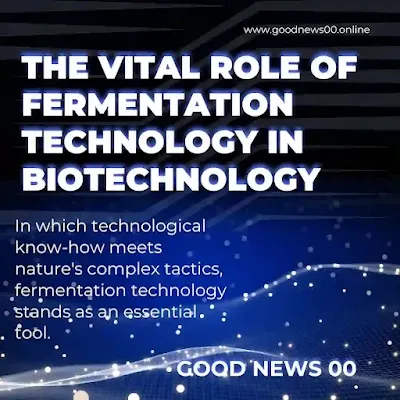Unlocking Nature's Potential: The Vital Role of Fermentation Technology in Biotechnology
In which technological know-how meets nature's complex tactics, fermentation technology stands as an essential tool.
From the production of existence-saving prescribed drugs to the introduction of sustainable biofuels, fermentation plays a pivotal function in harnessing the strength of microorganisms to convert raw substances into treasured merchandise.
This article explores the important position of the fermentation era in biotechnology and its transformative effect on diverse industries.
Understanding Fermentation Technology
At its center, fermentation is a metabolic manner in which microorganisms, including bacteria, yeast, or fungi, convert organic compounds into different substances, often inside the absence of oxygen.
This historical system has been harnessed by using people for millennia, from the fermentation of grains to provide beer and bread to the fermentation of milk to create cheese and yogurt.
In biotechnology, fermentation generation takes this herbal process to new heights, leveraging advanced clinical techniques to optimize microbial boom and product yield.
Modern fermentation processes are carefully managed and monitored, with unique changes made to factors inclusive of temperature, pH, and nutrient availability to make sure top-rated situations for microbial hobby.
Applications in Pharmaceutical Production
One of the most significant packages of fermentation generation in biotechnology is inside the production of prescribed drugs.
Many life-saving tablets, along with antibiotics, hormones, and vaccines, are manufactured the usage of fermentation approaches.
For instance, the antibiotic penicillin was initially observed inside the mould Penicillium, and its production on an business scale is predicated on fermentation technology.
Microorganisms are cultivated in massive fermentation tanks, wherein they produce the antibiotic through their metabolic sports.
Advances in fermentation technology have enabled the production of a extensive range of antibiotics, supporting to fight infectious sicknesses and shop endless lives.
Similarly, fermentation is used to produce insulin for the treatment of diabetes, as well as a number of vaccines, inclusive of those for hepatitis B and influenza.
By harnessing the strength of fermentation, pharmaceutical organizations can produce these vital medicinal drugs effectively and price-correctly, making sure a stable deliver for patients international.
Biofuel Production and Environmental Sustainability
In addition to prescribed drugs, fermentation era performs a critical function within the production of biofuels, providing a sustainable opportunity to fossil fuels.
Biofuels, consisting of ethanol and biodiesel, are made out of renewable organic sources, including corn, sugarcane, or algae, through fermentation strategies.
Ethanol, for instance, is generally produced by fermenting sugars derived from corn or sugarcane.
Yeast enzymes convert the sugars into ethanol and carbon dioxide, resulting in a renewable gas source that can be used to strength motors and reduce greenhouse gas emissions.
Similarly, biodiesel is produced by means of transesterification of fat or oils, regularly derived from crops including soybeans or palm oil.
Microbial fermentation also can be used to produce biodiesel precursors from non-meals assets, which include algae or waste cooking oil, in addition enhancing the sustainability of the method.
By utilising fermentation generation to supply biofuels, we can lessen our dependence on finite fossil fuel reserves and mitigate the environmental effect of traditional gasoline resources.
Additionally, biofuels offer the ability to create new economic possibilities in rural communities, wherein biomass feedstocks can be cultivated and processed locally.
Food and Beverage Industry Innovations
In the food and beverage industry, fermentation technology continues to power innovation, creating new flavors, textures, and nutritional profiles.
Fermentation is used to supply a wide range of merchandise, which include cheese, yogurt, beer, wine, and fermented vegetables.
For instance, the production of cheese relies at the fermentation of milk with the aid of lactic acid bacteria, which convert lactose into lactic acid, curdling the milk and giving cheese its function taste and texture.
Similarly, the fermentation of grapes with the aid of yeast is important for the manufacturing of wine, with extraordinary strains of yeast contributing to the specific flavors and aromas of every wine varietal.
In latest years, there was growing interest in fermented meals for his or her ability health blessings, together with stepped forward digestion, stronger nutrient absorption, and assist for a healthful microbiome.
Probiotic-rich ingredients, which includes yogurt, kimchi, and kombucha, incorporate stay microorganisms that could confer health benefits whilst ate up often.
Future Directions and Challenges
As we appearance to the destiny, fermentation era holds first rate promise for addressing a number of the maximum urgent demanding situations going through society, from food protection to environmental sustainability to human health.
Advances in genetic engineering and artificial biology are opening up new opportunities for engineering microorganisms to produce a extensive range of treasured merchandise, from biofuels to bioplastics to pharmaceuticals.
However, the massive adoption of fermentation technology additionally offers challenges, inclusive of the need to cope with concerns associated with biosafety, biosecurity, and ethical issues.
Additionally, as call for for fermented products keeps to develop, there may be a need to increase sustainable production methods that limit environmental impact and promote social equity.
In end, fermentation technology is a cornerstone of biotechnology, presenting a powerful tool for harnessing the metabolic competencies of microorganisms to produce treasured products.
From prescribed drugs to biofuels to fermented foods, fermentation can revolutionize multiple industries and pressure fantastic social and environmental trade.
By persevering with to innovate and collaborate across disciplines, we can release the whole capability of fermentation era and create a greater sustainable and resilient destiny for generations to come.


Comments
Post a Comment